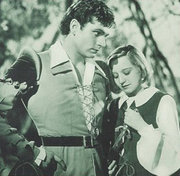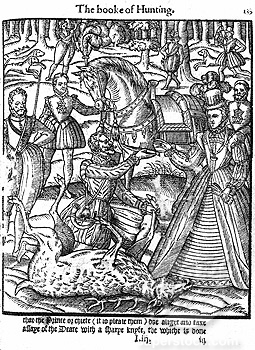
ACT IV
SCENE i
Rosalind and Jaques have a run-in. Jaques seems pretty goofy here, gloriously romanticizing his crummy depressing attitude as o-so-unique and refined:
I have neither the scholar's melancholy, which is emulation; nor the musician's, which is fantastical; nor the courtier's, which is proud; nor the soldier's, which is ambitious; nor the lawyer's, which is politic; nor the lady's, which is nice; nor the lover's, which is all these: but it is a melancholy of mine own, compounded of many simples, extracted from many objects, and indeed the sundry contemplation of my travels, in which my often rumination wraps me in a most humorous sadness. (IV.i.10-20)Rosalind replies, "A traveller! By my faith, you have great reason to be sad. I fear you have sold your own lands to see other men's; then to have seen much, and to have nothing, is to have rich eyes and poor hands" (IV.i.21-25). The economic circumstance is exactly de Vere's.
Supposedly in this scene, "Rosalind outphilosophizes Jaques as utterly as Orlando has outjested him" (Goddard, I 284). However, and this runs counter to critical consensus, Rosalind seems to be off the mark in her mockery of him. She tries to make his problem be that eclectic decentered aesthetic one hears of in The Merchant of Venice and Troilus and Criseyde -- that he acquires his fashion from various places abroad and has no defined identity or personal style: "Farewell, Monsieur Traveller: look you lisp and wear strange suits; disable all the benefits of your own country; be out of love with your nativity, and almost chide God for making you that countenance you are; or I will scarce think you have swam in a gundello" (IV.i.33-38). If the costuming department in the production complies, this might work convincingly, but is this an accurate diagnosis of Jaques? I think this character needs some reconsideration. In any case, it no doubt captures criticism levelled at de Vere when he returned from his continental travels.
Orlando shows up and Rosalind banters with him as lovers might, about being late, about cuckoldry, about dying for love (like Phebe, she's skeptical):
The poor world is almost six thousand years old, and in all this time there was not any man died in his own person, videlicet, in a love-cause. Troilus had his brains dash'd out with a Grecian club, yet he did what he could to die before, and is one of the patterns of love. Leander, he would have liv'd many a fair year though Hero had turn'd nun, if it had not been for a hot midsummer night; for, good youth, he went but forth to wash him in the Hellespont, and being taken with the cramp was drown'd; and the foolish chroniclers of that age found it was -- Hero of Sestos. But these are all lies: men have died from time to time, and worms have eaten them, but not for love. (IV.i.93-108)Rosalind ("Ganymede") invites Orlando to pretend to woo her, but she insists she would not be faithful: "can one desire too much of a good thing?" (IV.i.123-124); "men are April when they woo, December when they wed" (IV.i.147-148). Nevertheless, Orlando remains committed to his love ideal. Celia performs a mock marriage for the two, and Rosalind insists she would be annoying and wayward; as a couple, they would soon be out of sync -- "I will laugh like a hyen[a], and that when thou art inclin'd to sleep" (IV.i.155-156).
Orlando has an important wilderness lunch engagement, so they'll have to continue their intellectual frolicking at 2:00 pm. Rosalind whines about his departure and makes him vow to be on time.
When Orlando runs off, Celia tells Rosalind, "You have simply misus'd our sex in your love-prate" (IV.i.201-202). But Rosalind is dizzy with love. Until Orlando comes back, "I'll go find a shadow, and sigh till he come" (IV.i.216-217). Celia will sleep, she announces.

|
Here's the crux: critical consensus claims that Orlando is unworthy of the splendid Rosalind, not the least explanation for which is that he goes through all this and doesn't even recognize her? What does one do with his line, "I would kiss before I spoke" (IV.i.72)? The BBC production has him lunge at her too. If one considers the possibility that he knows that Ganymede pretending to be Rosalind is Rosalind, then the whole play transforms itself. It means that they both tacitly agree to play a game and spend time talking and relating before giving themselves over to the package that is "love." Think about other moments that would take on a new significance if in fact all this game-playing is fooling no one. |
|
SCENE ii Cool scene! We thought we were supposed to snort at Jaques earlier for being so hypersensitive and effete about deer hunting. Now here's a scene in which the Duke's men have killed a deer. This first might be passed off as a literalization of the hunting of the "hart" -- a long-time metaphor with an obvious pun in the realm of love literature. But this is an actual kill. So Jaques dripping with sarcasm probably unappreciated proposes that the murderer of the deer be pompously paraded back to camp as "a Roman conqueror" (IV.ii.3-4) and that he wear the horns upon his head as a sign of victory (a depiction of a fool, the ubiquitous joke about cuckoldry in Elizabethan literature), and also that we provide a glorious song: "'Tis no matter how it be in tune, / so it make noise enough" (IV.ii.8-9). The would-be foresters sing a stupid fruity court song about horn-wearing -- another standard courtly trope that seems rancid and moronic in light of the kill. "This plea for animals as having a rightful place in the earthly scheme that man is a usurper and a tyrant to deny them is one that will scarcely be heard again for hundreds of years after Shakespeare" (Ogburn 270). I say non-anachronistic kudos to Jaques for being nauseated by macho hunting b.s.
|

|
SCENE iii
Orlando is late again, but Silvius brings Rosalind a letter from Phebe. Rosalind either tries at first to spare Silvius the embarrassment of realizing that he's been duped into delivering a love letter from the woman he loves to another "man," or she tries from the start here to make him realize what a wretch Phebe is. She claims at first, "I say she never did invent this letter, / This is a man's invention and his hand" (IV.iii.28-29). She declares Phebe to be a "tyrant" (IV.iii.39), that the letter is filled with "railing" (IV.iii.43) -- this last interestingly true in a way about "complaints" or love poems that essentially accuse the recipient of cruelty by remaining aloof from the proferred love. The letter slimily requests "Ganymede" not to let Silvius know the contents. Celia is sympathetic to Silvius, but Rosalind again thinks he deserves no pity for wasting his time on the unworthy Phebe. She will nevertheless help him.
The formerly nasty Oliver enters and there's been a change. He is looking for Ganymede and Aliena and brings a bloody handkerchief, explaining that he was lying asleep under a tree as a snake glided over his neck. Orlando scared the snake away and battled a nearby lion who had culinary interest in Oliver. Orlando brought Oliver to the Duke "Who gave me fresh array and entertainment" (IV.iii.143) -- since apparently there's a wardrobe cave stocked for guests -- and collapsed from a lion wound on his arm, but not before he called out to Rosalind and bid Oliver to report all this at his appointment with "Ganymede." The whole thing is humorously ludicrous, but Oliver has had a "conversion" (IV.iii.136) and brotherly love has triumphed.
When Rosalind realizes the bloody handkerchief is Orlando, she faints, and then tries to convince Oliver that it was a "Counterfeit" faint (IV.iii.172), consistent with their role-playing; but Oliver doesn't buy it.